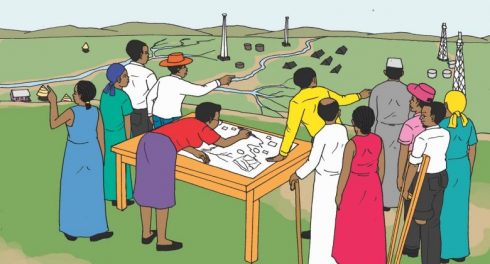Highlights
- Consequence time?
- Haven’t we been here before?
- What basis for trust?
- Lack of protection
- Show me the deal
- Follow the evidence
- TAI Spotlight: New year resolution – International Governance Day
Consequence time?

It seems 2020 is determined to cast its pall as-long-as possible. Last week’s events in Washington, D.C., leave us pondering accountability of those in government and the public sphere writ large. Impeachment is an option for the President, but what of those at other levels who spread disinformation? What culpability for the media? For social media platforms? Many of the themes covered in TAI Weeklies throughout 2020 have come to a head and no surprise that they are on the minds of our funder members – see TAI Spotlight below for a sampling of reactions.
This is not to say there are no bright spots entering the new year. One long awaited victory was passage of the Corporate Transparency Act (CTA) by a necessary veto-proof majority. Ian Gary reflects on the diverse coalition mobilized to get that long-awaited win against anonymous shell companies. Building on this momentum, Josh Rudolph says it’s time for the U.S. Treasury to go to war on corruption. Trevor Sutton and Simon Clark make a similar call on how the incoming administration can confront corruption and the global menace of graft. China continues to demonstrate its own hardline approach – the former boss of China Development Bank the latest to be given a life term for bribery under Xi Jinping’s now years-long (and highly political) anti-corruption campaign.
TAI will host a discussion this week on international anti-corruption opportunities under the Biden Administration – likely to include discussion of assuring strong regulations to implement the CTA. A word of warning comes from Tom Keatinge and Anton Moiseienko as they remind us of the importance of building for effective use of beneficial ownership data (all the harder in U.S. case as the required disclosures will not be public).
Encouraging then to see bilateral funders working with civil society on this challenge. TAI Member U.K. Foreign Commonwealth and Development office is partnering with Open Ownership to create the Transforming Procurement Systems project that utilizes beneficial ownership data to cut down COVID-19 procurement risks, while Norad and Global Financial Integrity launched another project with a beneficial ownership component – a radio show in Kenya aimed at building knowledge on illicit financial flows. Listen to the first show here.
Haven’t we been here before?

2021 is already seeing more nationwide lockdowns prompted by COVID-19 in different parts of the world, and further rounds of economic relief packages. That means further vigilance required and a chance to apply learnings from weaknesses in past support, not least in the U.K. where the £43 billion pandemic loan scheme has been “abused and defrauded on an industrial scale” according to one fraud expert, all detailed in a Financial Times investigation. Across, the Channel, a European Commission official pushes for extra safeguards on the E.U. €1.8tn pandemic recovery package.
Wastage has also been rife in COVID-19 emergency purchasing and Alastair Parvin makes a compelling case for using the crisis to fix long standing procurement failings. Shreya Agrawal urges stronger sustainability, transparency, and accountability standards for India’s healthcare procurement. Inspiration from Ecuador, with 8,299 emergency procedures worth a total of $247 million now available as open data and approximately 24,000 officials trained in how to do emergency procurement more efficiently and openly.
Rebalancing tax demands to account for those who have benefited during the pandemic should help, too. Digital tax reform is more a priority than ever. Want more evidence as to why? Follow the data sleuths taking on Amazon tax breaks.
Building more civil society capacity to track tax issues would help long term. To that end International Budget Partnership and the International Centre for Tax and Development (ICTD) took a sweeping look at CSOs working in taxation space. The new database features 171 organizations working across 66 countries and seven regions on tax issues, especially in lower-income countries. (Stay tuned for TAI commissioned research on civil society roles in tax administration in coming months.)
What basis for trust?
The success or not of rolling out vaccines and economic relief will impact government-citizen relations for years to come. In the meantime, Supriya Sadagopan and Taylor Salisbury share lessons about strengthening social trust, fiscal transparency, and citizen participation in governance from research spearheaded by Results for Development in Nigeria.
What can social accountability look like? Integrity Action’s series of animated videos showing the impact of their work in Afghanistan, Kenya, and Nepal.
Good to see the National Democratic Institute and Feedback Labs pilot a new methodology to close feedback loops between people and their governments to build back public trust in democratic governance. Tarik Nesh-Nash and Ousseynou Ngom spotlight how Moroccan reformers are advancing open government at the national and local levels through initiatives that bring together CSOs, government, locals, and Parliament. They see a holistic and citizen-centric approach to governance as central to sustaining democracy and inclusive growth.
Another way to improve governance and achieve true democracy is through equitable representation. Ellen Johnson Sirleaf, the first and only elected woman African head of state, says while young Africans want more political participation, many have lost faith in the civil service. She urges government leaders to open the door to them and invest in young professionals. Staying with youth participation, IREX proposes a set of learning questions to understand local networks and determine how to engage with youth-led networks and strengthen development systems.
TPA Full Disclosure: Raising civil society capacity in Georgia

Some 20 years ago, a transparent and open government was inconceivable in a country like Georgia. Here is how the Institute for Development of Freedom of Information (IDFI), is making it possible.
Lack of protection
No holiday cheer as civil society repression intensified from Turkey to Uganda to Hong Kong.
To mark Human Rights Defenders’ Day last month, Viviana Krsicevic proposed three ways to defend human rights defenders. Concerns extend to the digital realm – civil society organizations called for a full integration of human rights in deploying digital identification systems following their review of the World Bank Principles on Identification for Sustainable Development.
Meantime, Shelley McKinley shares a four-part approach to closing the digital divide to ensure an equitable economic and successful COVID-19 recovery. Many governments haven’t figured out how to govern the digital world. But with some of the world’s largest tech firms, Michael Pisa, Kay McGowan, and Priya Vora say better U.S. leadership on digital policy is vital.
Want some positive news? Access Now shares 50 key victories for digital rights from the past year
Show me the deal
As of January 1st, all 55 countries implementing the EITI Standard are required to publish new and amended extractive contracts. 37 had previously published some or all contracts, but it will require vigilance to see follow through by all – hence a Publish What You Pay #DiscloseTheDeal campaign on the topic and a reminder from the EITI community on important takeaways of the value of such disclosure. For their part, the OECD published its Guiding Principles for Durable Extractive Contracts to assist host governments and investors in explaining the content of the contract to the public.
Follow the evidence

Image Credit: M SUR/ Shutterstock via Inside Philanthropy
Birte Snilstveit, Laurenz Langer, and Tamara Lotfi describe how hard it is for policymakers to track all of the Covid-19 publications, dashboards, and data trackers. 3IE, the Africa Centre for Evidence, and Global Evidence Synthesis are teaming up to offer rigorous and timely synthesis to low and middle-income countries to inform policymaking. (See also TAI’s own COVID Monitor Issue 1 on all the transparency and accountability related trackers).
Funders, too, care about evidence to inform grantmaking. It is core to MacKenzie Scott’s approach to grantmaking – leaning on expert, data-driven analysis to choose the best projects. U.S. foundations gave away more than ever before in 2020 in response to overlapping crises, but Scott alone accounted for $4.1 billion of that.
Kathleen Enright, president of the Council of Foundations, argues that even though philanthropies are spending record amounts, they must focus on how they are giving, while Nobel Prize winner Esther Duflo warns that without a rethinking of how grants are negotiated, international assistance risks becoming “irrelevant.” Larry Kramer of TAI member Hewlett Foundation offers his take on giving levels, and you can read that of MacArthur’s John Palfrey under TAI Spotlight below
What of spending it all? S.D. Bechtel, Jr. Foundation did just that – spending last of its funds in December 2020, but you can access their legacy collection of resources, including work on organizational resiliency, working with consultants, and spend-down and exit practices. Candid’s Issue Lab houses them through their Knowledge Centers service offering.
We hope and anticipate that overdue action for racial justice will continue into 2021. Based on her experience at Save the Children, Janti Soeripto proposes four levels at which organizations can uphold anti-racism: individual allyship, internal processes, programmatic design, and narratives promoted through storytelling, brands, and reports.
TAI Spotlight: New year resolution – International Governance Day
New year resolution – International Governance Day | Transparency and Accountability Initiative
How can we ensure that governance and accountability stay for good on the international agenda in every country? A U.N International Governance Day may be the answer for the world today. Richard Dion argues that this one day focus each year would help thousands of entities advocate for accountable governance – leading to progress on every other day of the year.
Carnage and triumph: American democracy on the spot | Open Society Foundations
While white supremacy and authoritarianism reared its ugly head at the streets and steps of U.S capitol last week, OSF President Mark Malloch‐Brown says the Foundations has never ignored America’s problems, but hope its democratic process offers a way forward. Open Society Deputy Chair, Alexander Soros also described the events at the Capitol Hill “a terrorist assault on democracy.” He calls on all leaders of conscience to condemn the chaos, urge calm and restore stability to a capitol under siege.
America is broken, so we asked some of its greatest minds how they would fix it | Ford Foundation
Ford Foundation’s President, Darren Walker, joined other experts to offer concrete ideas to address some of America’s biggest problems and why prioritizing worker’s healthy and safety now and in post pandemic is key to building a better America. Read his reaction to the recent insurrection at the United States capitol and why democracy is the greatest threat to white supremacy.
Trust is the glue of a healthy society | Chandler Foundation
The current breakdown in trust reflects deep social challenges. Chandler Foundation’s CEO, Tim Hanstad writes on the value of trust and how to rebuild trust for a healthy society.
Securing the future of U.S. elections | Hewlett Foundation
U.S. Democracy Program Officer Vanessa Tucker looks back at the 2020 election and identifies lessons that can be used to ensure trust in the democratic process in 2021 and the years to come.
The case for Foundations to do more in times of crisis | MacArthur Foundation
MacArthur Foundation President John Palfrey discusses how foundations should spend more money, even when stock markets (and therefore endowments) are low. Senior Evaluation Officer, Maurice Samuels and Evaluation Officer, Liz Oo, talk about their experiences as evaluators of color. Their conversation touches on lessons for the field, including more inclusive evaluation methods, meeting communities where they are, and challenging racism through evaluation and learning.
AI Roadmap | Foreign Commonwealth and Development Office
The UK government has published an independent report with key recommendations from the AI Council on the strategic direction of AI. “Public trust in AI is vital. The UK should lead, encourage and enable public scrutiny of automated decision-making,” says Martin Tisné, Managing Director, Luminate and UK AI Council member.
Job Listings
- Researcher vacancies at the Tax Justice Network: Latin America and Francophone Africa – January 31, 2020
- Policy consultant at Accountability Counsel – Ongoing
- Government Affairs Senior Policy Advisor, International Financial Institutions at Oxfam – Ongoing
- Data Architect at Open Data Institute – Ongoing
- Luminate Director, Africa – Ongoing
- Job postings at Hewlett Foundation – Ongoing
- Job postings at MacArthur Foundation – Ongoing
- Job postings at Open Society Foundations – Ongoing
- Job postings at Luminate – Ongoing
- Job postings at Ford Foundation – Ongoing
- Senior Policy Advisor for Civic Space at Oxfam America – Ongoing
Call/ Opportunities
- The RightsCon call for proposals – January 19, 2021
- I-RAnT! Nigeria Influencing Grant – February 7, 2021
- European Commission public consultation on sustainable corporate governance initiative – February 8, 2021.
- Call for submissions to SSIR Series: Social change in an era of extreme polarization – Last Thursday of every month until early 2021
- USAID’s Development Innovation Ventures (DIV) grant funding – Ongoing
- BetterTogether Challenge for innovators – Ongoing
- Call for research proposals Tax and civil society – No Deadline
- Free Digital Security Training – Ongoing
- Open Road Alliance Charitable Grant and Loan to organizations responding directly to COVID-19 – Ongoing
- Pulitzer Center Coronavirus news collaboration challenge – Applications will be reviewed on a first-come, rolling basis
- Call for proposals: Informality, tax, and the state – Proposals accepted on a rolling basis
Calendar
- How to Craft an Annual Fundraising Plan in Uncertain Times – January 14 2021
- Mining Data in Action: Building Trust and Transparency – February 15, 2021
- Democracy, civil society, and digital technology – February 17-18, 2021
- 2021 Data on Purpose conference – February 17-18, 2021
- Data on Purpose: Democracy, Civil Society, and Technology – February 17-18, 2021


